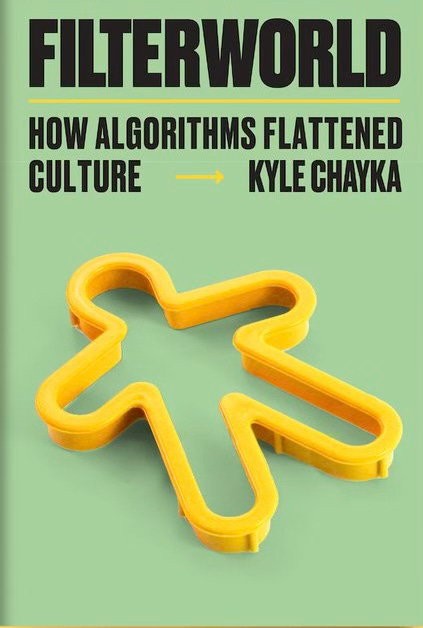I am listening …
to Finnish composer Kaija Saariaho’s Papillons for solo cello. There are seven miniatures or studies of a butterfly, fragile and fleeting movements with no beginning or end. The whole work lasts just under twelve minutes and is renowned for its use of extended techniques for cello, though the ephemeral quality of the music will surely make it difficult to fixate on the technical aspects.
I am reading about …
AI, algorithms and their impact on arts and culture and came across Kyle Chayka’s book Filterworld. Chayka is an American journalist and author who writes about technology, culture, and their intersection. His book Filterworld explores how algorithms are flattening culture and the effects of personalisation and recommendation systems on the arts and society.
Chayka argues that the lowest common denominator is promoted at the expense of the complex, diverse or challenging, and how pushing different - and sometimes dangerous - agendas comes in the disguise of a promise to anticipate our interests. De facto warping our perception of reality and worldview, leading us to unwittingly cede control of our individual growth and decision-making to AI.
Chayka’s chosen examples really drive it home. There is Google Maps, which influences your choice of an evening out by pushing certain restaurants and venues whilst ignoring others. Thousands of coffee shops all over the world look eerily similar (and Instagrammable), bookshops are arranged in a way that entices snapshots and posts, and the music on Spotify, or films on Netflix that we see promoted on our homepages often have nothing to do with our search history, library, playlists or taste. Instead, they are driven by the companies pushing certain artists and films to an unhealthy degree, whilst the ones we are actually looking for are hard to find.
It’s a bit as if your least favourite person has taken over your bookshelf, first re-arranging it so you cannot find anything, then storing some of your favourites away in the basement, and finally substituting your most beloved novels and music with plagiarisms and watered-down substitutes.
And just like the consumer, many artists are, more or less consciously, giving in to the pressure of Filterworld. As Chayka notes, artists have long evaluated their work based on numbers, such as the number of concert tickets sold or the price of a painting. But before Filterworld, artists have never been so influenced by data and the precise assessment of attention at any given moment.
Art itself - not to mention artists as people - tends not to be bound by the quest for likability, and yet likes ❤️ are what the current tyranny of quantification prioritises most. (Kyle Chayka)
This dependence on likes influences the aesthetics of coffee shops, the choice of music for a new recording, the style of a writer, the sketch of an artist, and the recipe of a chef …
Essentially, our perception of reality is increasingly moderated through AI-driven platforms and this Filterworld has now profound implications for how we create and consume art, narrowing our cultural horizons, and polarising instead of connecting.
And this is where the (human) curators come in, again!
Skilled curators bring depth, context, and emotions to their selections. They can weave together differing elements into a cohesive whole, creating experiences for the audience, and understanding the cultural significance, and the historical context. Like a storyteller, the curator's role is not just to select, but to communicate - to provoke thought, and create meaningful connections that strike a chord with audiences. And most importantly:
Curators slow down the unending scroll and provide their followers with a way of savoring culture, rather than just inhaling it, developing a sense of appreciation. (Kyle Chayka)
I love how the Elbphilharmonie is tackling these developments head-on, stressing how important human curators are in the world of art and music. Their next creator-in-residence is not a musician but a professional music fan (as he describes himself), DJ and curator.
Whether Derrick Gee is unearthing treasures from the Tokyo jazz scene, reflecting critically on the impact of streaming platforms on our listening behaviour, discussing whether vinyl is here to stay or spending three hours on music by Ryuichi Sakamoto, he wants to open up the world of music listening. Chayka calls him a “formative figure of a new generation of online culture curators”.
During the Elbphilharmonie’s 2024/25 season, Derrick Gee will take his one million subscribers across various platforms on multiple discovery tours around the venue, listening to concerts, chatting with people, and performing as a DJ, all the while seeking answers to the question:
What’s happening right now with live music in an increasingly digital culture of music listening?
I love to see and hear what he comes up with.
Till next time,
Kirsten






